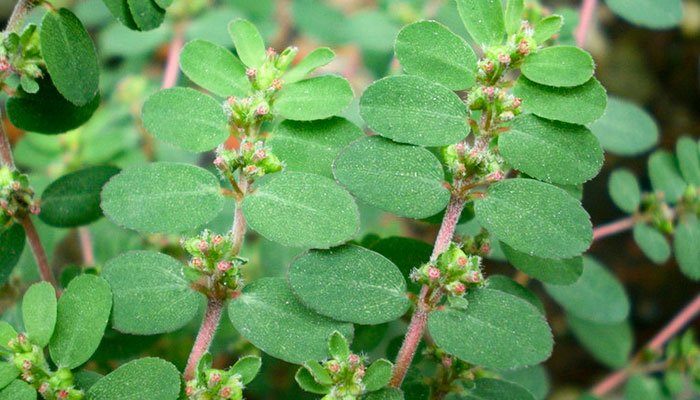What Is Di Jin Cao
Di Jin Cao is also known as Euphorbia Humifusa or Euphorbia Maculata, which is an annual herb belonging to the family Euphorbiaceae. It first appeared in <Jia You Ben Cao> (materia medica of Jia you reign) around 1,057-1,060 AD.
Euphorbia Humifusa like a warm and humid environment and often grow in fields, wastelands, sand dunes, hillsides, or roadsides. They are widely distributed in temperate regions of Eurasia.
Euphorbia maculata known as spotted spurge is a common garden and lawn weed in the United States. According to <medicinal plant annals of Tianmu Mountain>, the efficacy of Euphorbia maculata is similar to that of Euphorbia humifusa, so they are often used interchangeably. In 2005, Euphorbia maculata was included in the Chinese Pharmacopoeia.

Every summer and autumn, people gather Euphorbia Humifusa or Euphorbia maculata, remove their impurities, wash them with water, cut them into sections, dry them in the sun, and make them into Chinese herbal medicines.
Di Jin Cao contains quercetin, kaempferol, luteolin, rutin, isoquercitrin, lupeol, β-sitosterol, brevifolin, brervifolincaboxylic acid, methyl brevifolincarboxylate, gallogen, palmitic acid, gallic acid, methyl gallate, scopoletin, umbelliferone, ayapin, mesoinositol, alkaloids, and vitamins.
According to <Compendium of Materia Medica>, the medicinal nature of Euphorbia Humifusa is relatively neutral, with a pungent taste. It has a certain therapeutic effect on the pathological changes of the liver and large intestine meridians.
In traditional Chinese medicine, it is often used to clear heat and remove toxins, cool blood and stop bleeding, treat bacillary dysentery, enteritis, chyluria, acute bronchitis, hookworm infectious dermatitis, chronic colitis, hemorrhoid bleeding, uterine bleeding, traumatic bleeding, jaundice, and snake bites. It is an important component of Changyanning tablets.
Benefits
- Anti-inflammation, anti-virus, and anti-tumor.
- Lowering blood sugar, triglycerides, cholesterol, and having an analgesic effect.
- Increasing the weight of immune organs, enhancing the phagocytic ability of macrophages, and improving immunity.
- Reducing the damage of CCL4 to liver tissue and protecting the liver.
- Increasing the number of platelets, promoting platelet aggregation, and stopping bleeding.
- Improving the activity of superoxide dismutase, reducing the level of malondialdehyde, and delaying aging.
- Clearing heat, treating diarrhea, bloody dysentery, bloody purulent stool caused by damp-heat or heat toxins.
- Cooling blood, treating tooth bleeding, uterine bleeding, and hemorrhoid bleeding caused by blood heat.
- Promoting urination, relieving difficult and painful urination, and treating hematuria.
- Draining dampness and treating jaundice caused by damp-heat.
- Removing heat toxins, relieving skin swelling and pain, and treating sores and carbuncles caused by heat toxins.
- Inhibiting Staphylococcus aureus, Streptococcus hemolyticus, Diphtheria bacillus, Escherichia coli, Typhoid bacillus, Dysentery Bacillus, Pseudomonas aeruginosa, Pasteurella, and Salmonella.
Combinations
- It can be used in combination with Ma Chi Xian (Purslane), Di Yu (Radix Sanguisorbae), etc. to treat bloody dysentery and bloody purulent stool.
- It can be used in combination with Bai Mao Cen (Rhizoma Imperatae), Xiao Ji (Cirsium Setosum), etc. to treat hematuria and relieve difficult and painful urination.
- It can be used in combination with Yin Chen (Herba Artemisiae Scopariae), Zhi Zi (Fructus Gardeniae), Huang Bai (Cortex Phellodendri), etc. to treat dysuria, and jaundice caused by damp-heat.
- It can be used in combination with Tie Xian Cai (Acalypha australis), Hai Jin Sha (Spora Lygodii), etc. to treat acute diarrhea in infants and young children.
- It can be used in combination with Ge Gen (Kudzu Root), Huang Lian (Rhizoma Coptidis), Mu Xiang (Radix Aucklandiae), Dang Shen (Radix Codonopsis), Bai Zhu (Rhizoma Atractylodis Macrocephalae), etc. to treat chronic colitis.
Side Effects
- At present, there is no literature report that Di Jin Cao has toxic effects, and no data is showing that taking it will cause serious adverse reactions.
- A small proportion of patients taking it may cause allergic reactions such as itching and rash.
Precautions and Warnings
- The dosage of Di Jin Cao should be controlled at 9-20g.
- When using fresh Di Jin Cao, the dosage should be controlled at 30-60g.
- It can be made into decoctions, pills, or mashed for external use.
- People who are allergic to Di Jin Cao should not take it.
- It should not be taken with medicines containing gentamicin, ferrous sulfate, or ferrous fumarate.
- Patients with weakness of the spleen and stomach should not take it.
- Patients with blood deficiency should not take it.
- Pregnant women and children should not take it.
